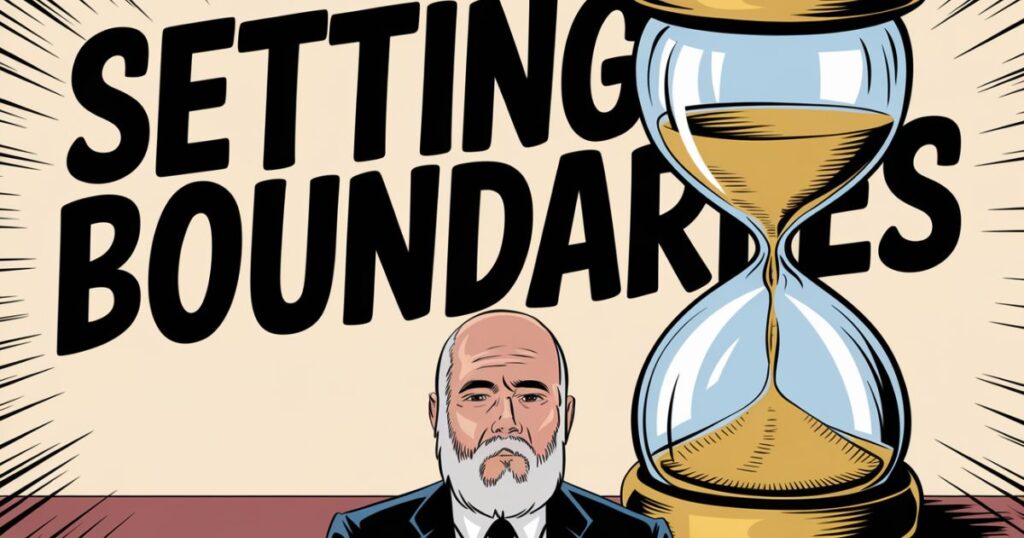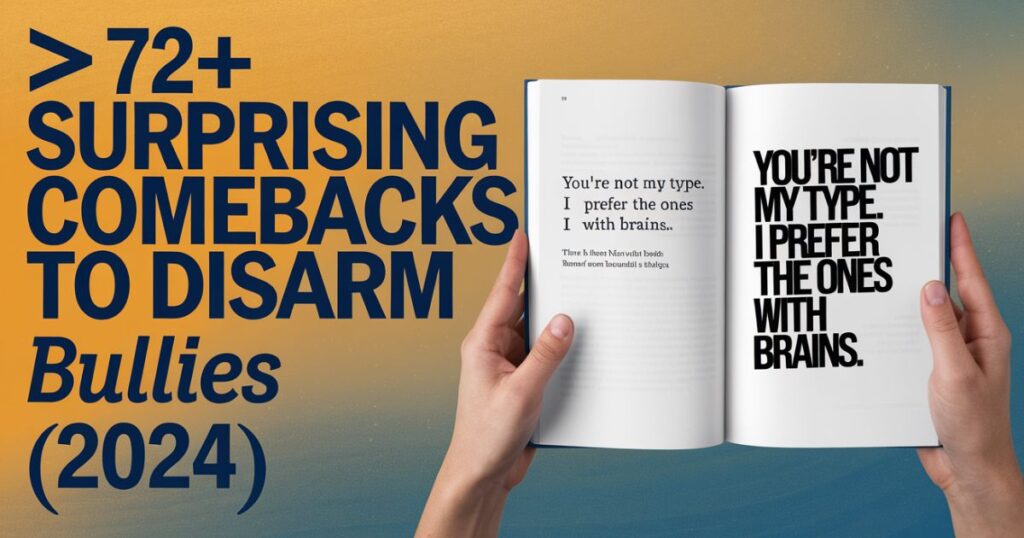Bullying can happen to anyone, but knowing how to respond can make all the difference. A good comeback can disarm a bully and make them rethink their actions. These comebacks are meant to help you stand your ground with confidence and dignity.
In 2024, there are over 72 surprising comebacks you can use to handle bullies. These responses range from witty remarks to calm statements that show you’re not easily shaken. Whether you’re dealing with school bullies or workplace harassment, these comebacks are designed to empower and protect you.
Best Comebacks to Disarm the Bullies | Clever Replies
Bullies often use harsh words to bring people down, but a clever comeback can stop them in their tracks. A smart response can make them rethink their actions without escalating the situation. These comebacks are witty, calm, and aimed at disarming their negative energy.
Whether you’re facing insults at school, work, or online, these comebacks will help you stand up for yourself. With humor or wisdom, you can show the bully their words have no power over you. The key is to stay confident and keep your cool.
Read Also: 40 Simple Answers to Any Well Wish You Receive
1. Setting Boundaries

- “I’m not comfortable with that. Please stop.”
- “That’s not something I want to discuss.”
- “I need some space right now.”
- “I won’t tolerate being spoken to like that.”
- “I have the right to say no.”
- “Please respect my privacy.”
- “I’m not available for that at the moment.”
- “That crosses a line for me.”
- “I need you to respect my decision.”
- “Let’s keep this conversation respectful.”
- “I’m setting this boundary to take care of myself.”
- “I understand your opinion, but this is my choice.”
- “This topic is off limits for me.”
- “I’m not okay with how things are going.”
- “Please don’t assume you know what’s best for me.”
- “I need time to think about this.”
- “Let’s change the subject.”
- “I’m not ready to talk about that.”
- “I’ve made my decision, and I’m sticking to it.”
- “I won’t engage in this kind of behavior.”
- “I can’t take this on right now.”
- “I need you to back off a little.”
- “That’s not something I can help you with.”
- “I won’t continue this conversation if it stays disrespectful.”
- “I expect you to honor my boundaries.”
- “Please don’t push me on this.”
- “I’m drawing a line here.”
- “I’m not interested in participating.”
- “This is what I need, and I hope you understand.”
- “I’ve told you my limits. Please respect them.”
2. Reflecting on the Insult
- “That’s an interesting opinion, but it says more about you than me.”
- “Are you sure you want to define yourself with that comment?”
- “I’ll take that as a reflection of how you’re feeling, not who I am.”
- “It sounds like you’re projecting something personal.”
- “I wonder if you’ve ever thought about why you say things like that.”
- “Does saying that make you feel better about yourself?”
- “I hope one day you realize words like that don’t build you up.”
- “What does that comment say about the person you want to be?”
- “I’ll let you sit with that thought for a while.”
- “Is that really what you wanted to communicate?”
- “I’d love to understand what made you feel the need to say that.”
- “Does that insult come from a place of hurt?”
- “Do you think that comment adds anything valuable to the conversation?”
- “I can’t help but wonder what you’re trying to prove with that.”
- “Is that how you want to be remembered?”
- “It’s interesting you think that would hurt me.”
- “That insult feels more like a reflection of your insecurities.”
- “What made you choose those words? Are you okay?”
- “I’m curious, does being mean ever make you feel good long-term?”
- “Why do you think saying that will achieve anything?”
- “Does hurting others help you deal with your own pain?”
- “Your words say more about you than they do about me.”
- “I hope one day you realize kindness goes a lot further.”
- “Is there a reason you felt the need to insult me today?”
- “Does it help you to put others down to lift yourself up?”
- “If you’re saying that to get a reaction, it’s not working.”
- “I’ll remember that, but probably not in the way you want.”
- “Do you think people admire you for saying things like that?”
- “I wonder what made you so angry that you’d say something like that.”
- “Are you sure that’s what you want people to remember about you?”
3. Calm and Confident Ways

- “I’m not bothered, but thanks for your opinion.”
- “You must be having a tough day. I hope it gets better.”
- “I’m too busy being awesome to care.”
- “You say a lot about me, but none of it defines me.”
- “I’ll let your words stay with you, where they belong.”
- “I don’t need your approval to know my worth.”
- “I prefer lifting people up, not tearing them down.”
- “Is that the best you’ve got?”
- “Thanks for sharing, but I’m good with who I am.”
- “Your opinion doesn’t really matter to me.”
- “You’re entitled to your thoughts, I just don’t agree.”
- “I’ll continue being me, and you can continue being you.”
- “I guess it’s a good thing I don’t need your validation.”
- “You’re welcome to think whatever you want, but it won’t change me.”
- “I’m too focused on my goals to get distracted by negativity.”
- “Your words say more about you than they do about me.”
- “I don’t engage in pointless arguments.”
- “I don’t take insults to heart, I take them as a reflection of you.”
- “Interesting perspective, but it doesn’t affect me.”
- “Thanks for your input, but I’m happy just the way I am.”
- “I’ll keep doing my thing, regardless of what you think.”
- “I choose to rise above, not sink to your level.”
- “Everyone is entitled to their opinion, even if it’s wrong.”
- “I don’t take negativity personally; it’s not my baggage.”
- “Your words don’t match my reality.”
- “I don’t take insults from people I wouldn’t take advice from.”
- “I value kindness, not negativity.”
- “I’m confident enough not to let your words get to me.”
- “That’s your opinion, but I know my truth.”
- “You can say what you want, but it won’t change who I am.”
4. Pointing Insecurities

- “Funny, I was just thinking the same about you.”
- “Insecurities? I thought we were talking about you.”
- “Your opinion about me doesn’t define who I am.”
- “I must be important if you’re so focused on me.”
- “Projecting much?”
- “Is this your way of showing you’re jealous?”
- “If my flaws bother you so much, that sounds like your problem.”
- “Your need to point that out says more about you than me.”
- “Thanks for noticing, but I’m pretty happy with who I am.”
- “Everyone’s got insecurities; at least I’m aware of mine.”
- “I didn’t realize my confidence intimidated you.”
- “Oh, you’re still stuck on that? I’ve moved on.”
- “Trying to bring me down won’t lift you up.”
- “I wonder why you feel the need to point that out.”
- “Funny, I didn’t ask for your opinion.”
- “That’s cute. Are you trying to be mean?”
- “Why waste your time focusing on me?”
- “Looks like you’re projecting your insecurities onto me.”
- “Your need to criticize is more revealing than you think.”
- “Well, if you think that makes me insecure, guess again.”
- “I know I have flaws, but they don’t define me.”
- “I’m good with who I am. You should try it sometime.”
- “Focusing on my weaknesses won’t fix yours.”
- “Is this supposed to hurt? Because I’m unbothered.”
- “Not everyone’s perfect, but I’m okay with that.”
- “It’s interesting how much time you spend judging others.”
- “I’m not here to meet your expectations.”
- “If pointing out flaws is your hobby, you need a new one.”
- “Your words don’t affect me the way you think they do.”
- “I’d rather be confident in myself than worry about your opinion.”
5. Clever & Witty Comebacks
- “I’m sorry, did you say something? I only listen to people who make sense.”
- “Your opinion is like a broken pencil pointless.”
- “I could agree with you, but then we’d both be wrong.”
- “I’d explain it to you, but I left my crayons at home.”
- “If I wanted to hear from someone who doesn’t matter, I’d listen to the wind.”
- “I’m not arguing, I’m just explaining why I’m right.”
- “Oh, you have something to say? Let me get my ‘not caring’ face ready.”
- “I’d give you a comeback, but you’re not worth the effort.”
- “Please, keep talking. I always yawn when I’m fascinated.”
- “I’m not ignoring you, I’m just giving you the attention you deserve.”
- “It’s amazing how you can speak without knowing anything.”
- “You bring everyone so much joy when you leave the room.”
- “If laughter is the best medicine, your life must be a cure for the world.”
- “Is your drama going to have an intermission, or is it a one-act play?”
- “I’m sorry, I didn’t catch that. Could you repeat it in a more intelligent way?”
- “You’re like a cloud when you disappear, it’s a beautiful day.”
- “Your negativity is like a vacuum, it sucks the life out of the room.”
- “I don’t need your attitude. I have my own, thank you.”
- “Are you always this annoying, or is today special?”
- “I’d agree with you, but then I’d be as wrong as you are.”
- “You must be a magician because whenever you speak, everyone disappears.”
- “I can’t decide whether you’re incredibly brave or just too clueless to realize you should stop talking.”
- “Oh, you again? I thought the circus had moved on.”
- “If ignorance is bliss, you must be the happiest person on earth.”
- “You’re like a dictionary, you add meaning to everything you say or at least you try.”
- “I’m not a mind reader, but I can already tell your thoughts are empty.”
- “I would’ve roasted you, but it looks like life already did.”
- “I could listen to you all day, but I have better things to do like anything else.”
- “You remind me of a software update nobody asked for you, but here you are.”
- “Thank you for your opinion, but I’ve heard better advice from a fortune cookie.”
6. Disarming with Empathy & Kindness

- “I’m sorry you feel that way, hope your day gets better.”
- “It seems like you’re going through something, is everything okay?”
- “I’m not upset, I hope things turn around for you soon.”
- “Everyone has bad days, I hope yours gets better.”
- “I understand you might be frustrated, let’s work through it.”
- “It must be hard feeling like that, I’m here if you want to talk.”
- “I hope you find some peace with whatever is bothering you.”
- “Your words seem hurtful, but I don’t think that’s who you really are.”
- “It sounds like you’re struggling, can I help in any way?”
- “We all have our tough moments, I’m here for you.”
- “I see you’re upset, and I genuinely hope things improve.”
- “I choose not to argue, but I hope things get better for you.”
- “Whatever is going on with you, I’m sending positive thoughts your way.”
- “I can see you’re upset, but I believe we can figure this out together.”
- “I hope whatever is making you angry gets resolved soon.”
- “I understand you’re upset, but we can get through this with kindness.”
- “It seems like something’s bothering you. I’m here to listen.”
- “It’s okay to have tough times. I hope yours gets better soon.”
- “Let’s find a way to turn this negative moment into something positive.”
- “You deserve to feel better than this. I hope things look up for you.”
- “It sounds like you’re having a hard time; let’s work through it kindly.”
- “I’m not here to argue, but I am here to support you.”
- “I see you’re hurting, and I hope that pain goes away soon.”
- “Let’s not fight, maybe we can find a better way to communicate.”
- “I’m sorry you’re feeling this way. I hope things get better for you soon.”
- “I understand your frustration, but there’s a more peaceful way forward.”
- “I know things are tough right now, but we can handle this together.”
- “Let’s try to approach this with a little more understanding.”
- “Whatever’s troubling you, I hope you find peace with it soon.”
- “I choose kindness, and I hope you can too.”
7. Questioning & Redirecting Focus
- Why are you so focused on me today?
- Is something bothering you that you want to talk about?
- What’s the real issue here?
- Are you sure that’s the best way to handle things?
- Why do you feel the need to act this way?
- Can we focus on something more positive instead?
- What’s the point of this conversation?
- Are you trying to prove something to yourself?
- Why don’t we talk about something else?
- Is there a reason you’re acting like this?
- Do you think being mean makes you look better?
- Why waste time on negativity?
- What are you really trying to achieve?
- Is this really who you want to be?
- Does making others feel bad make you feel better?
- Why don’t we focus on finding solutions instead?
- Are you feeling okay? This seems out of character for you.
- What does this accomplish for you?
- Is this really how you want to spend your energy?
- What’s your goal here?
- Why not use your words to build others up?
- Are you sure this is the conversation you want to have?
- Why are you so concerned about what I’m doing?
- Can we switch topics to something more constructive?
- Why do you care so much about this?
- What are you hoping to get out of this?
- Is there something more important we should focus on?
- What’s the real reason behind your comment?
- Why don’t we shift the focus to something positive?
- How does this benefit anyone?
Final Thoughts
In conclusion, the surprising comebacks to disarm bullies provide effective strategies for reclaiming your power and confidence. By using these clever replies, you can deflect negativity and shift the conversation in a more positive direction.
Remember, the goal is not just to silence the bully, but to empower yourself and maintain your self-respect. With these comebacks in your toolkit, you can face bullies head-on, transforming their hurtful words into opportunities for growth and resilience. Stay strong!
FAQs
What causes bullying?
Bullying is often caused by a combination of factors, including social dynamics, power imbalances, and individual issues such as low self-esteem or a need for control.
What should I do if a comeback escalates the situation?
If a comeback escalates the situation, remain calm and acknowledge the other person’s feelings. Redirect the conversation to a more constructive topic or suggest taking a break to cool down.
Can using comebacks have a long-term impact on bullying behavior?
Using comebacks can deter bullying behavior by empowering victims and shifting the power dynamic.Reliance on verbal retaliation may escalate conflict and does not address underlying issues of bullying.
How can I ensure my comeback is effective and not hurtful?
To ensure your comeback is effective and not hurtful, focus on expressing your feelings calmly and assertively without resorting insults.
What if I can’t think of a response at the moment?
It’s okay to take a moment to gather your thoughts; you can acknowledge the question and respond later. If needed, ask for clarification or give a brief, honest response to buy some time.






